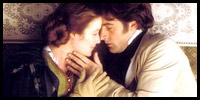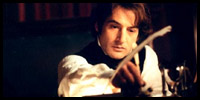
 |
Possession (2002) Directed by Neil LaBute Cast: Aaron Eckhart, Gwyneth Paltrow, Jeremy Northam, Jennifer Ehle, Lena Headey, Toby Stephens, Trevor Eve, Anna Massey, Holly Earl 2002 – 102 minutes Rated: Reviewed by Dustin Putman, August 17, 2002.  A literate, delicately woven romantic drama that plays itself out more as a book would than a movie, it comes as no surprise that "Possession" is based on a novel by A.S. Byatt. Directed by the until-now king of cynicism Neil LaBute (1997's "In the Company of Men," 1998's "Your Friends & Neighbors," 2000's "Nurse Betty"), this is easily the most gentle and hopeful film in LaBute's current repertoire, if far from his best. At the same time, "Possession" features an excellent quartet of performances making their way through a minor, but emotionally gratifying, story about the rewards and sacrifices one must go through in order to experience the love of a lifetime.
A literate, delicately woven romantic drama that plays itself out more as a book would than a movie, it comes as no surprise that "Possession" is based on a novel by A.S. Byatt. Directed by the until-now king of cynicism Neil LaBute (1997's "In the Company of Men," 1998's "Your Friends & Neighbors," 2000's "Nurse Betty"), this is easily the most gentle and hopeful film in LaBute's current repertoire, if far from his best. At the same time, "Possession" features an excellent quartet of performances making their way through a minor, but emotionally gratifying, story about the rewards and sacrifices one must go through in order to experience the love of a lifetime.
 Roland Michell (Aaron Eckhart) is an American who has come to England to perform research on his favorite 19th-century poet Randolph Henry Ash. When he discovers a supposedly unfound love letter written by Ash to a mistress in the pages of a book, it is the kind of finding that may very well change the history books. Since Ash was an alleged monogamist who wrote in his poetry about looking at no other woman than his wife, this is very big news, indeed. Suspecting that this secret love was fellow poet Cristabel LaMotte, Roland seeks out the aid of English scholar and LaMotte enthusiast Maud Bailey (Gwyneth Paltrow). As Maud and Roland grow closer through their further studies of these poets, time is turned back to 1859 to capture the personal exploits of Ash (Jeremy Northam) and LaMotte (Jennifer Ehle) as their uncontrollable love grew deeper and more dangerous.
Roland Michell (Aaron Eckhart) is an American who has come to England to perform research on his favorite 19th-century poet Randolph Henry Ash. When he discovers a supposedly unfound love letter written by Ash to a mistress in the pages of a book, it is the kind of finding that may very well change the history books. Since Ash was an alleged monogamist who wrote in his poetry about looking at no other woman than his wife, this is very big news, indeed. Suspecting that this secret love was fellow poet Cristabel LaMotte, Roland seeks out the aid of English scholar and LaMotte enthusiast Maud Bailey (Gwyneth Paltrow). As Maud and Roland grow closer through their further studies of these poets, time is turned back to 1859 to capture the personal exploits of Ash (Jeremy Northam) and LaMotte (Jennifer Ehle) as their uncontrollable love grew deeper and more dangerous.
 With a premise that may seem more at home on the BBC network than the big screen, it is director LaBute and the four central actors who inject enough passion and depth into the heart of "Possession" to mostly overcome this obstacle. With two different love stories evolving in two separate time periods, LaBute uses many clever scene-changing devices to intercut between them, sometimes in the very same shot. This ingenious filmic design plays out, rather indelibly, as if ghosts from the past have begun invading the lives of the present-day protagonists, and vice versa. Despite the obvious challenge presented in allowing each romance to live and breath on its own without feeling undernourished, LaBute and co-screenwriters David Henry Hwang and Laura Jones have done a respectable job in handling both time periods.
With a premise that may seem more at home on the BBC network than the big screen, it is director LaBute and the four central actors who inject enough passion and depth into the heart of "Possession" to mostly overcome this obstacle. With two different love stories evolving in two separate time periods, LaBute uses many clever scene-changing devices to intercut between them, sometimes in the very same shot. This ingenious filmic design plays out, rather indelibly, as if ghosts from the past have begun invading the lives of the present-day protagonists, and vice versa. Despite the obvious challenge presented in allowing each romance to live and breath on its own without feeling undernourished, LaBute and co-screenwriters David Henry Hwang and Laura Jones have done a respectable job in handling both time periods.
 As the afflicted poets of the past, Jeremy Northam (2001's "Gosford Park") and Jennifer Ehle (2000's "Sunshine") are at a constant uphill battle in lending complexity to their characters and relationship, since they have less screen time than their two fellow principles, and they pull it off amicably. Ehle—an almost creepy dead-ringer for Meryl Streep—is almost brilliant in her heartrending portrayal of a woman who is struggling to choose between two forbidden loves, that of the married Ash and a female painter (Lena Headey).
As the afflicted poets of the past, Jeremy Northam (2001's "Gosford Park") and Jennifer Ehle (2000's "Sunshine") are at a constant uphill battle in lending complexity to their characters and relationship, since they have less screen time than their two fellow principles, and they pull it off amicably. Ehle—an almost creepy dead-ringer for Meryl Streep—is almost brilliant in her heartrending portrayal of a woman who is struggling to choose between two forbidden loves, that of the married Ash and a female painter (Lena Headey).
 In the overlapping and, overall, more successful modern-day story, LaBute-mainstay Aaron Eckhart (2000's "Nurse Betty") and a British-speaking Gwyneth Paltrow (2001's "Shallow Hal") set off requisite fireworks together. Eckhart and Paltrow invigorate their scenes with classy witticism and an uncontrollable attraction bubbling underneath the surface, allowing their educated characters of Roland and Maud to slowly develop into fully fleshed-out people. Especially impressive is the subtle transformation Paltrow goes through from being a dry, uptight scholar to someone who finally unearths the joy and freedom in her life to literally and figuratively let her hair down.
In the overlapping and, overall, more successful modern-day story, LaBute-mainstay Aaron Eckhart (2000's "Nurse Betty") and a British-speaking Gwyneth Paltrow (2001's "Shallow Hal") set off requisite fireworks together. Eckhart and Paltrow invigorate their scenes with classy witticism and an uncontrollable attraction bubbling underneath the surface, allowing their educated characters of Roland and Maud to slowly develop into fully fleshed-out people. Especially impressive is the subtle transformation Paltrow goes through from being a dry, uptight scholar to someone who finally unearths the joy and freedom in her life to literally and figuratively let her hair down.
 "Possession" is genuinely romantic and, although slow-paced, never boring. In comparison to the challenging past works of Neil LaBute, however, the film is rather insignificant and meager in the long run. There are several unforeseen plot developments that enter the lives of the characters, but, like the movie itself, are never earth-shattering. LaBute is ultimately capable of much more than "Possession" has to offer, but he breathes a luscious optimism to the proceedings that have, until now, been mostly absent on his resume.
"Possession" is genuinely romantic and, although slow-paced, never boring. In comparison to the challenging past works of Neil LaBute, however, the film is rather insignificant and meager in the long run. There are several unforeseen plot developments that enter the lives of the characters, but, like the movie itself, are never earth-shattering. LaBute is ultimately capable of much more than "Possession" has to offer, but he breathes a luscious optimism to the proceedings that have, until now, been mostly absent on his resume.
©2002 by Dustin Putman |
 |













